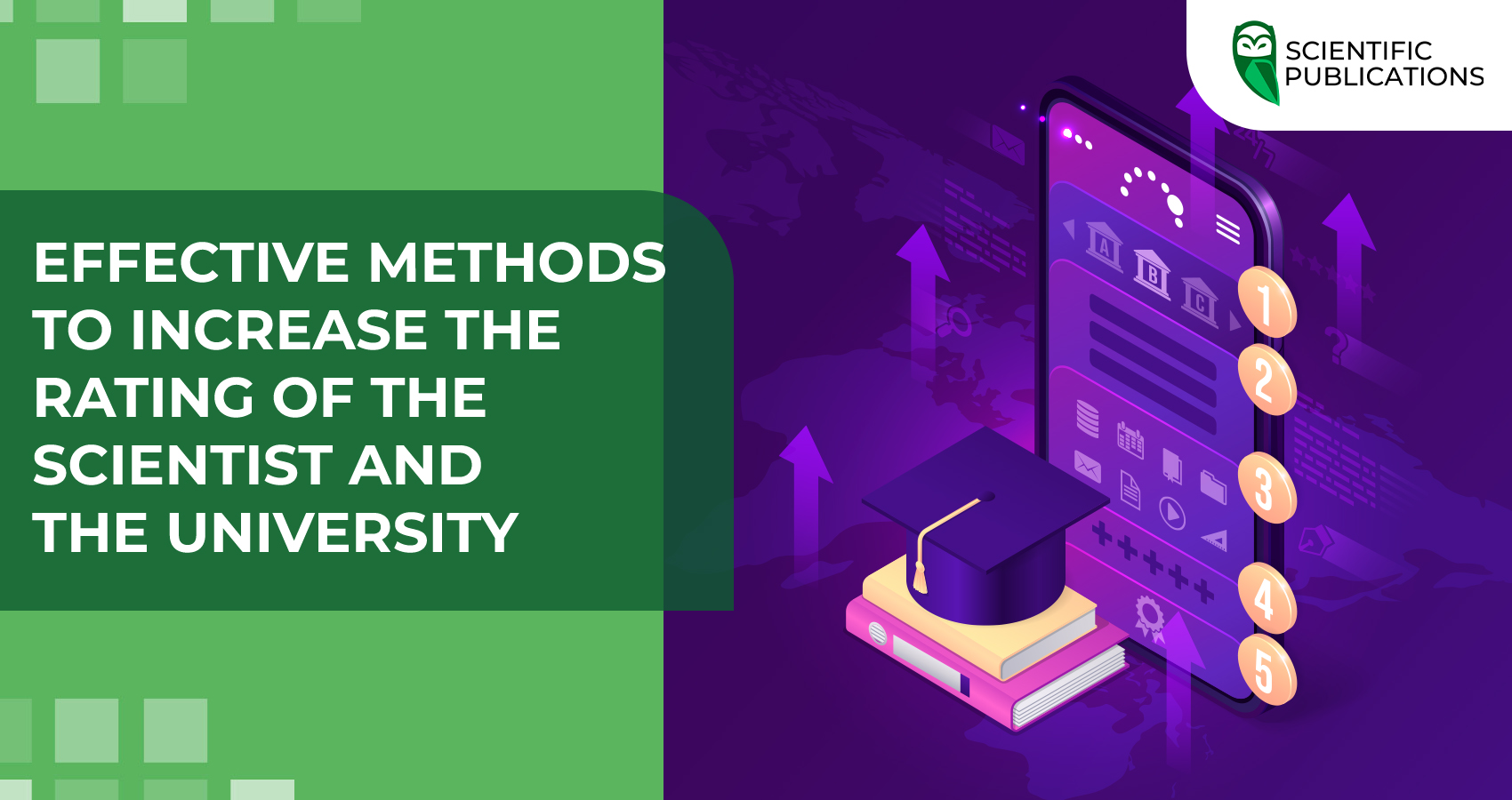Raising the ranking of a researcher and a university is a complex and lengthy process that requires constant work, time, and resources. It is well known that the activities of individual scientists play an important role in determining the position of higher education institutions and shaping the country's international scientific image. In the modern scientific environment, where competition is constantly growing, it is important to have effective methods and strategies to achieve high performance. In this article, we will analyse what steps can contribute to their improvement.

Increase the rating of a researcher
Publish scientific articles in reputable databases
Regular publications in scientometric databases, such as Scopus and Web of Science, significantly increase the reputation and ranking of a researcher. Articles published in journals with high scientometric indicators attract more attention from the international scientific community, as there is no doubt about the quality of published materials due to the expertise of specialists and a rigorous peer review process.
Increase the Hirsch index
The H-index is a key indicator that demonstrates the scientific impact of a researcher. It is displayed in the author's profile on various scientometric platforms, databases, and libraries. The indicator is calculated based on the number of scientific publications and their citations, which indicates the popularity of the work among fellow scientists. A high h-index indicates that the researcher's work has been widely recognised in the scientific community, increasing his or her credibility and scientific rating.
After a successful publication in a journal indexed in Scopus or Web of Science, you should not rest. It is important to continue your career by planning new works, as each article creates a resonance that needs to be maintained. Try to co-author more with well-known authors who have high scientific performance, as this approach will positively affect your credibility in the scientific community and help you advance your career more quickly. Collaboration with experienced researchers allows you to gain new knowledge, expand your professional contacts and improve the quality of your publications, which in turn can lead to an increase in the citation of your work.
Attendance at courses, seminars, and workshops
Attending courses, seminars, and workshops is an important element of a scientist's professional development, as it helps to keep abreast of the latest achievements in their field, which broadens scientific horizons and improves the quality of research. Participation in such events provides an opportunity to acquire practical skills in new methods, technologies and analytical tools. Scientists who are constantly improving their skills become more attractive to international research teams and projects due to their up-to-date knowledge and practical skills. The knowledge and experience gained can be used to conduct research and write new scientific articles, which increases the citation and rating of a scientist in academic databases.
Membership in scientific organisations
Membership in scientific organisations often indicates recognition of a scientist's scientific authority and provides access to exclusive scientific events, resources, and opportunities. Such organisations become platforms for scientific discussions, cooperation in international projects, and provide access to leading experts. This can lead to joint publications and projects with high scientific impact.
Raising the university's ranking
Scientific publications
Scientific publications play an important role in shaping a university's ranking. They demonstrate the activity of its teachers and researchers in scientific activities, contributing to the dissemination of knowledge and increasing the visibility of the educational institution in the academic environment. The more publications in prestigious international journals, especially those indexed in the Scopus and Web of Science databases, the higher the scientific image and ranking of the university. This not only enhances its reputation but also attracts the attention of potential students and partners.
Hirsch Index
The Hirsch index is an significant indicator of the scientific productivity of university teachers and researchers, as it reflects both the number of publications and their citations. A high h-index of scientists has a positive impact on the overall ranking of the university in international tables, as it indicates the level of impact of its research. This, in turn, increases the attractiveness of the university for foreign students and researchers, contributing to its prestige and opportunities for funding research projects.
International internships
All rankings also take into account the quality of teaching. To improve the learning process, there are programmes for teacher training and development. One of these initiatives is international internships. Some universities encourage their staff to do an internship, while others make it a mandatory condition in the employment contract. An internship at a foreign university increases the level of knowledge of teachers, their qualifications, and competence, which certainly has a positive impact on the university's ranking.
Strategies to improve university rankings:
- Hiring the best teachers.
- Drawing up a SWOT analysis.
- Strengthening incentives (rewards, benefits, etc.).
- Increasing motivation.
- Working with student feedback.
- Developing effective marketing and branding strategies.
- Internationalisation.
Let's look at an example of one of the rankings.
National H-index Ranking
The National H-index Ranking is an independent international ranking that evaluates the scientific effectiveness of scientists, research teams and institutions in a particular country using the integrated Hirsch index. The ranking covers various countries, including Kyrgyzstan.
The ranking is based on the overall Hirsch index of the country's scientific institutions, using data from such scientometric platforms as Scopus, Web of Science and Google Scholar. Based on this data, the National H-index Ranking result is formed and the position in the ranking is determined.
In addition, the website presents an individual ranking of the TOP 1000 best researchers of scientific institutions according to the Hirsch index in the Scopus and Google Scholar databases.
The main factor affecting the ranking of scientists and universities is scientific publications in prestigious scientometric databases, so it is important to focus efforts in this area. Universities should develop and implement support and incentive programmes for scientists who publish in Scopus and Web of Science, as this directly increases the institution's ranking. The rating of a scientist not only affects the success of the institution where he or she is affiliated, but also shapes the global image of Kyrgyzstan in the research environment, which opens up new opportunities for students and staff.
“Scientific Publications” can help you publish a scientific article in the Scopus and Web of Science databases. In addition, we offer the opportunity to complete an online internship at one of the EU's top-ranked universities and receive an internationally recognised certificate for 6 ECTS credits. If you are interested in our offers or need a free consultation, please fill out the form below and our manager will contact you within a business day.





